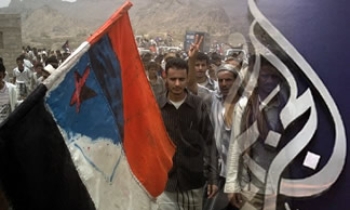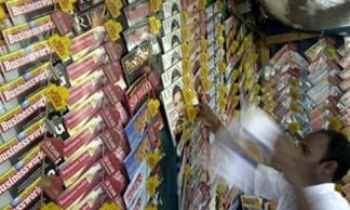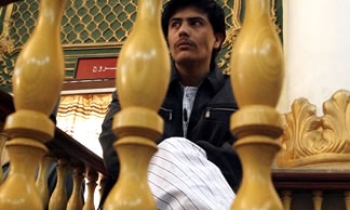BAGHDAD -- A month-long ban imposed by Iraq's government on Dubai-based satellite channel Al Arabiya highlights the delicate path that media in Iraq must tread between dangerous insurgents and prickly authorities.
More than 100 journalists have been killed in Iraq in the past three years while others have been imprisoned by the US-led coalition, and Iraqi officials have had a difficult relationship with the country's fledgling media.
On Thursday the Iraqi cabinet announced the month-long closure of Arabiya's offices in Baghdad. The network can still broadcast to Iraqi subscribers, but their reporters have been banned from working in the country.
"This ban is regrettable as Iraqis above all need access to freely reported news," the press freedom watchdog Reporters Without Borders said.
At Arabiya's offices the door to the studio is closed, its handle sealed in red wax by police and secured with an elasticated bandage.
On the door is a picture of Atwar Bahjat, an Iraqi Arabiya journalist who was kidnapped as she reported on the destruction of a Shiite shrine in Samarra in February before being tortured and killed.
"The journalists in Iraq are the most targeted in the world, why?" asked Arabiya correspondent Majid Hamid, outside the studio door.
"There is an elected Iraqi government, insurgent groups, political parties, how can you satisfy everyone?" he complained.
Hamid said that he and his colleagues had been holding an editorial meeting September 7 when they learned from state television that their office had been closed for a month. They ignored the message and continued working.
A few hours later, police came with a statement alleging "distortions of facts and inaccuracies" in Arabiya's coverage and stating that there was "clear intention of your channel to provoke sectarian tensions and promote violence.
"This should be considered as a final warning in hopes that your previous behavior will be corrected," concluded the statement, signed by cabinet secretary Farhad Nematullah.
A spokesman for the Dubai-based channel insisted that "coverage by Al Arabiya is professional, balanced, and based on the level of importance of the information."
Prime Minister Nuri Al Maliki's media advisor Yassin Majid appeared on state television to detail the channel's missteps, highlighting its allegedly incendiary coverage of a massacre in Baghdad's Jihad neighborhood in July.
Hamid insisted, however, that the channel's coverage differed little from that of international news agencies and was in some cases more conservative.
"These reports are based on reality and we cannot change it," he said.
"They say that Arabiya is a sectarian news channel, but what about the other television channels that are even more sectarian? They are igniting the violence, not Arabiya," he said.
There has been a proliferation of new television channels since the overthrow of Saddam Hussein's regime, with many representing specific ethnic or sectarian groups, something reflected in their coverage.
According to the US-based Committee to Protect Journalists (CPJ), authorities in Iraq have been quick to level defamation charges against journalists critical of their policies.
"These cases of official harassment undermine the public commitments of Iraqi officials to democracy and a free press," said Ann Cooper, executive director of the CPJ in a letter to the Iraqi prime minister in June.
"Press freedoms have also been undermined by acts of censorship, criminal prosecutions of journalists, intimidation, and physical threats against the media by Iraqi officials," she added.
The CPJ also voiced alarm about the case of Ahmed Mutair Abbas, the managing editor of the defunct daily Sada Wasit in the southern city of Kut, on trial for defaming police and judges in Wasit province.
The trial, which has dragged on since last year, was recently moved to Baghdad at the request of the defendants, but Abbas has not been heard of since Sunday when he left his home in Kut to attend the trial.
He faces more than 10 years in prison if convicted under Article 226 of the Iraqi penal code for defamation in connection with articles he wrote in 2005.
In July 2004 Al Jazeera, the other major Arab satellite network, was expelled by the Iraqi government for reporting on insurgent attacks and being a "mouthpiece" for terrorism.
Arabiya was also briefly suspended by the Iraqi government in November 2003. In October 2004 insurgents detonated a car bomb outside their offices killing seven people.
"The insurgents don't like Arabiya and now it looks even as though the Iraqi government doesn't like Arabiya either," said Hamid.









